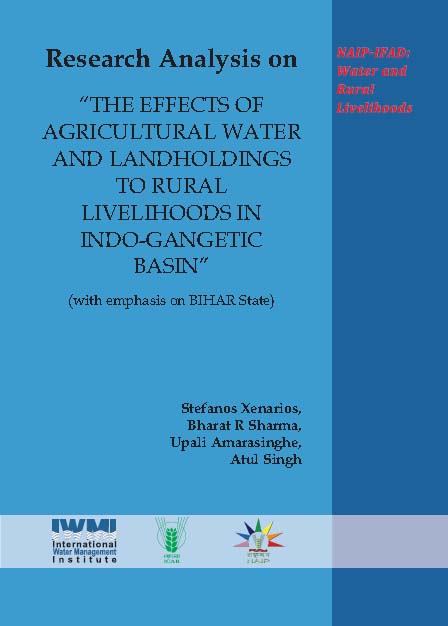International Water Management Institute
The effects of agricultural water and landholdings to rural livelihoods in Indo-Gangetic basin – Research analysis by IWMI and ICAR with an emphasis on Bihar
Posted on 18 Apr, 2011 11:56 PM The current research analysis by International Water Management Institute (IWMI) in cooperation with ICAR Resear
The current research analysis by International Water Management Institute (IWMI) in cooperation with ICAR Resear
Converting rain into grain: Opportunities for realizing the potential of rainfed agriculture in India - A working paper by the Challenge Programme on Water and Food
Posted on 22 Aug, 2010 10:41 PMThe study was done under the "Strategic Analyses of India’s National River Linking Project", of the Challenge Programme on Water and Food (CPWF) to estimate the available runoff in the potential regions to mitigate the terminal drought in the dominant rainfed districts of India.
Energy supply and the expansion of groundwater irrigation in the Indus-Ganges Basin - A working paper by Challenge Program on Water and Food
Posted on 22 Aug, 2010 08:27 PMThe paper by International Water Management Institute (IWMI), Challenge Programme for Water and Food (CPWF) and University of Arizona deals with energy supply and expansion of groundwater irrigation in the Indus-Ganges basin. Irrigation using groundwater has expanded rapidly in South Asia since the inception of the Green Revolution in the 1970s and it represents the largest source of irrigation in the basin.
Assessing and improving water productivity in conservation agriculture systems in the Indus-Gangetic basin – A working paper by Challenge Program on Water and Food
Posted on 22 Aug, 2010 02:38 PMThe paper by Challenge Programme on Water and Food (CPWF) attempts to assess and improve water productivity in conservation agriculture systems in the Indus-Gangetic basin, in which during the past 40 years an intricate mosaic of interactions between man & nature, poverty & prosperity and problems & possibilities has emerged. Rapid expansion in agricultural water use is a common theme across these interactions and access to water is central to the livelihoods of the rural poor.
Water, climate change and adaptation: Focus on the Ganges river basin - A working paper by Challenge Program on Water and Food
Posted on 18 Aug, 2010 11:11 PMThis working paper by the Challenge Program for Water and Food explores the intersection between water management, climate change, and adaptation in the Ganges River system, a basin vital to the security, economy, and environment of South Asia.
Recognizing that an understanding of both the science and the policy of water management, climate change, and adaptation is rapidly evolving, it is not the intention of the paper to encompass all the issues related to these broad fields, but rather to provide a starting framework from which to further develop research questions and priorities for work in water and adaptation.
Impact of climate change on water resources and glacier melt and potential adaptations for Indian agriculture - A working paper by Challenge Program on Water and Food
Posted on 17 Aug, 2010 11:24 PMThe paper by the Challenge Program on Water and Food deals with the impact of climate change on water resources & glacier melt and potential adaptations in Indian agriculture. Global climatic changes will have major effects on precipitation, water availability, glacier/ice melt, and sea level rise. Climate-induced changes in hydrological conditions will affect the magnitude, frequency, and damage costs of future extreme events.
Is irrigation water free? A reality check in the Indo-Gangetic Basin – A working paper by the Challenge Program on Water and Food
Posted on 17 Aug, 2010 09:41 PMThe paper generated under the Challenge Program for Water and Food (CPWF) project explores in some depth a totally different dynamic in the irrigation economy of the vast Indo-Gangetic basin (IGB), an important exception to the global characterization. The global debate on ‘‘water as an economic good’’ presumes that irrigation water supply is delivered, controlled, and priced by public institutions. In the developing world, the price of water is kept so low that water use cost leaves farmers no incentive to use it efficiently.
Reverse osmosis plants for rural water treatment in Gujarat - A research paper by CAREWATER
Posted on 23 Mar, 2010 01:38 AMThis research paper attempts to understand and map the Reverse Osmosis (RO) phenomenon, a technology that is turning out to be an important solution for drinking water treatment in rural Gujarat. Treatment plants with capacity ranging from 10 litres per hour (lph) to 6000 lph are now supplying drinking water in several hundred villages of the state. Small sized plants with capacity < 20 lph are used by individual families whereas medium to large sized plants (>100 lph) are being used for public consumption.
Impacts of groundwater contamination with fluoride and arsenic- a report by International Water Management Institute
Posted on 29 May, 2009 10:50 AMArsenic and fluoride are the two main natural contaminants of groundwater in India. The related diseases due to prolonged exposure are arsenicosis and fluorosis, prevalent in many arid villages of India.
Urban wastewater: a valuable resource for agriculture - case study from Haroonabad, Pakistan (2002) by International Water Management Institute (IWMI)
Posted on 01 May, 2009 12:15 PMThe study by IWMI deals with a case study of urban wastewater as a valuable resource for agriculture in Haroonabad, Pakistan. Farming communities in water-scarce regions increasingly practice the use of urban wastewater in agriculture. Untreated urban wastewater is generally considered unacceptable for direct use because of potential health risks.